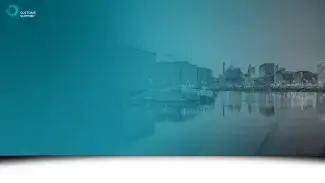The Port of Liverpool
The Port of Liverpool is situated on both sides of the River Mersey and provides the only ocean access to the Manchester Canal.
There are two container terminals in the Port of Liverpool: Seaforth Container Terminal and Liverpool2. The latter was launched in 2016 in response to growing demand in the area, and is a £400m state-of-the-art container terminal.
Liverpool2 features the UK’s first fully-automated steel terminal, which uses automation and real-time reporting to reduce back-office paperwork and processing. The terminal was extended in 2023 following record volumes, and now has a capacity of over 600,000 tonnes annually.
Following the upgrade of the Port of Liverpool with the second terminal, the port features 43 docks and is capable of berthing the largest vessels in the global fleet.
Alongside the port’s container and steel capabilities, there are terminals for bulk and Ro/Ro cargoes, as well as a large rail terminal which has been extended with each phase of Liverpool2’s growth. Inland, the Port of Liverpool is served by three motorways and provides easy access to other main roads further out.
Liverpool City Region Freeport
The Port of Liverpool is within the Liverpool City Freeport, a Free Economic Zone (FEZ). Announced in 2021 the impact of freeports in the UK is still relatively unknown, but the initial results are that those areas chosen have seen significant investment.
Alongside Peel Port’s continuous upgrades to the area, companies working with development in green energy, manufacturing, and pharmaceuticals have already earmarked Liverpool City Freeport as a place to drive innovation.
The freeport is estimated to bring £800m in investment, as well as 14,000 direct and indirect jobs – with over £850m to enter the local economy.
There are a range of tax benefits for eligible businesses within the freeport area:*
- Stamp Duty Land Tax relief
- Enhanced capital allowances for investment in plant and machinery and structures and buildings
- Business rates relief
- Employer National Insurance contributions relief
From a customs perspective, the benefits include:*
- Access to duty suspension, duty exemption on re-exports and flexibility on how duty is calculated through duty inversion.
- Allows storage and processing activities in a freeport customs site under one combined Freeport customs special procedure, instead of multiple authorisations.
- Streamlining the processes for bringing goods into freeport customs sites, as well as between customs sites, and re-export.
- Allowing the movement of goods by conduct between other UK customs sites and into other special procedures to fit the needs of the business.
*Information from https://www.liverpoolcityregion-ca.gov.uk/freeport
Customs Support Group in Liverpool
The Liverpool office was set up in October 2021 by Britannia Bureau, who were acquired by the CSG in 2022.
There, the team provide a comprehensive range of customs and trade solutions. From duty management services and customs consultancy through to import declarations and export clearances – you can rely on us for a digital-first service which keeps you both efficient and compliant.
Contact us for more information.
The history of the Port of Liverpool
The Port of Liverpool has a history over 800 years, but the beginnings of the modern dock was constructed in 1715. It was the world’s first commercial wet dock – which is where the water level is controlled so that vessels are less reliant on tides to navigate in or out, or be unloaded.
In the 19th century, there was rapid expansion of the city of Liverpool and the need for capacity at the port particularly after the opening of the Liverpool to Manchester railway in 1830. The Albert (now the Royal Albert) and the Stanley docks were built in the 1840s to facilitate the extra capacity.
The late 20th century saw decline for the port, but also a renewal as the harbour authorities modernised the facilities in an effort to attract more business. It was in 1972 that the Seaforth Terminal was opened with the popularisation of shipping container use.
Today, the port continues to be a key part of the local economy and an important trade hub for the North of England, Scotland, and Northern Ireland. The area facilitates approximately 45% of all UK-USA trade, and connects the North of the UK with major European ports such as Rotterdam and Antwerp.
Development by Peel Ports in the last decade, recent investment by the government and businesses as a result of freeport status, and the continued interest of both mean that the Port of Liverpool is set to grow even more in the future.
Did you know:
- Liverpool has the most grade II listed buildings outside of London, with more than 2500 buildings and 250 public monuments listed. This includes the Port of Liverpool Building, which is one of “three graces” of Liverpool City which are all located at the Pier Head.
- The nickname for Liverpudlians, “scouser”, comes from the Norwegian dish lobscouse, which was made popular by sailors at the Port of Liverpool in the 19th century.
- Seaforth was the first container terminal in the UK.
- The Pier Head, Royal Albert Dock, and Stanley Dock are all registered as UNESCO World Heritage Sites since 2004.
- The Port of Liverpool was essential in both World War I and World War II, serving as both a supply convey link for Britain and a base of operations for western approaches to mainland Europe. This is where the legendary Captain Johnny Walker ran his operations in World War II, protecting both merchant and D-Day vessels from U-boats.
Need help with customs in the Port of Liverpool?
CSG is here for you. Supported by our colleagues across the UK, Ireland, and the rest of Europe, you can rely on us for timely, accurate, and compliant customs services in the Port of Liverpool. Contact us for more information.














